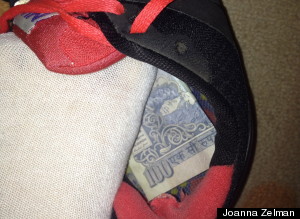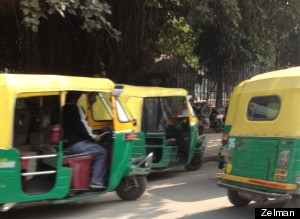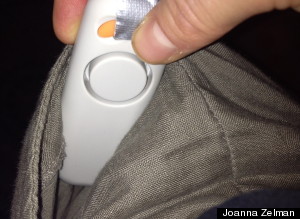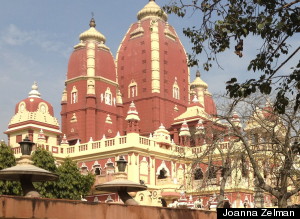
When I first moved to New York, I lived on a "sketchy" street featuring an occasional stabbing and a rumored gang presence that I never saw, unless the 80-year-old men on bodega stoops were, in fact, geriatric gang leaders.
My mother made me promise that when traveling home after dusk, I would take a cab, make the driver wait as I put my key into the lock and call her upon entering my building.
I compromised: Before 12 a.m., I walked home. After 12 a.m., I ran, hobbling in heels with my jacket collar popped like a detective, skirt flailing and keys clutched above my head.
I recently informed my mother I'd be traveling alone for a sustainable development summit to New Delhi, India. The region was in the headlines for the horrific gang rape and murder of a young woman, an area considered one of the most unsafe cities for women in the country.
My mother offered to email me the news articles, similar to when I was a teenager, when she spent the weeks before my driver's test clipping the police blotter of teenage car accidents.
My first day in New Delhi, I headed to nearby Connaught Place, a region my dear friend Google told me to visit in the hurried few minutes I spent online at JFK Airport.

Sporting loose brown pants, 100 rupees in my left shoe, three layers of wrinkled shirts, a money belt tucked under the second shirt layer and looped through my pants, glasses, frizzy hair running amok, old sneakers and an alarm in my pants pocket, I exited the hotel gates.
I embraced the thrilling scene before me, soaked in the hazy 70-degree sunshine, then stumbled on the dusty rubble sidewalk, where women squatted cooking over pots, caring for barefoot children clinging to their sides. Two rigid dogs splayed dead across the obstacle course of a walkway. Rickshaws weaved between the honking cars as vehicles charged close to crashing, then swerved away just in time, the street's madness flowing as an impossible puzzle miraculously fits together.
The men hurried past or eagerly jogged alongside me, asking, "What's your name ma'am? Where are you from? Do you want directions? Here let me show you. Let me show you."
One young man, his hair slicked to one side, followed me, rapidly repeating, "Let me show you where to go. Here, come this way, I'll show you. Connaught Place? You're going wrong way. Let me show you."
My voice squeaking, I mumbled, "That's okay, thanks. That's okay. I'm fine, thanks."
A street split to the left, and my heart thuh-bumped annoyingly against my chest. I was almost sure the hotel clerk had said "turn left," I could almost hear him telling me "first left," but I could almost hear "second left" too, or maybe I'd mistaken "third" for "first"? Straight ahead there were so many women and children and bricks and pots and dogs and carts and one very persistent man. So I turned left and crossed the street, forgetting I was not a piece that fit in this traffic puzzle.
A rickshaw skidded around me, his horn tooting, and I ran across the rest of the street.
I took a breath, then heard, "Let me show you where to go. Connaught Place? You're going wrong way." The man had crossed with me.
My head down, I quickly walked this new street, muttering, "That's okay, thanks. That's okay. Thanks though." He followed until I looked him in the eyes and declared, "No." With that, he threw his hands up in frustration, and turned away.
At this point, I examined the street. Yes. Yes, I had heard wrong, because "first left" was a dead end.
I looked behind me, not wanting to pass by the man, that persistently correct man who knew I was going the wrong way.
Tourists often ask me for directions in New York. Afterwards, they often then walk in the opposite direction of my advice. A few minutes later, they scurry by me again, offering an abashed wave of "Yes, yes, you were right, I assumed that after three hours here, I knew a better route to Times Square than a person with three years of experience."
No way would I be that tourist, having to wave to the slick-haired man as I passed by him again.

Instead, I spotted an older man in an auto rickshaw on the corner.
"Excuse me, do you know how to get to Connaught Place from here?"
"Connaught Place? Where in Connaught Place?"
"Oh just the ah -- the center I guess?"
"Connaught Place is very big m'am, very big. Where do you want to go?"
"Um, I guess like, the market area?"
"There are many markets in Connaught Place, which one did you want to go to?"
"Just I guess, one of the main ones?" I yearned for Google.
"Okay, I can take you to a market."
I debated my options, then climbed into the rickshaw.
"What's your name?"
"Raj."
"Nice to meet you Raj. I'm Joanna."
My mother says robbers are less likely to rob a person after learning their name.
Raj weaved between the cars, as I slid back and forth on the seat, debating whether I was more likely to be hit by a car on the right or left side -- and if I was hit by a car on the right side, perhaps it was actually better to be seated on the right side, because I'd have farther to travel before rickshaw ejection? I finally settled on bracing myself in the center of the bench.
We snaked between air-conditioned red buses, non-AC green buses and child-mother-father trios on motorcycles. I considered unzipping my iPhone from the moneybelt to snap a photo, fighting my mother's voice warning a passerby could, in fact, reach into a moving rickshaw to snatch an iPhone, or the driver could slam on the brakes, grab my iPhone and run down the highway.
Suddenly, Raj turned off into a dark, empty, gated building. Well, this was it. My mother was right.
"Where are we going?"
"Market. I wait for you here."

I felt for my alarm. Every Christmas, I received pepper spray or a pocket alarm in my stocking. I knew this particular alarm worked because I'd accidentally jerked the cord in a library once, and people had started evacuating, thinking it was the fire alarm. That's how good this alarm was.
More confident with my hand in my pocket, I entered the building.
Rows of pashminas lined the back, elephant figurines to the left and teas to the right. Only the storeowners populated the enormous room. One rushed to greet me.
"Hello, welcome, please come in. Let me show you around. First customer of the day brings good luck. You like pashminas?"
"Oh I'm fine, thanks."
"You want two? I can give you even better price."
I was quickly learning that despite spouting, "I'm fine, thanks," for most of my life, it was an utterly worthless phrase.
I wandered to a woman standing behind a case of saris and asked, "Could I get a deal if I buy two?"
"Why, you don't like them?"
"Oh, um, no, I just... I just thought maybe there was a deal if I bought two instead of one."
"You don't think they're worth price?"
The lights flickered, and then went out. Well, this was it. This was how I died. Filled with guilt trying to haggle a deal on two saris.
She gently whispered, "This happens, just wait. Generator will start."
We stood in silence for 30 seconds.
As the lights flickered back on, a man gestured to another room. "How about a carpet from Kashmir?"
"Oh, um, I don't think I can buy a carpet."
"No one comes thinking they will buy a carpet."
My mother was the type of person who entered a store for a pashmina and walked out lugging a 12-foot carpet.
"No, thanks."
"How about a bag?"
He knelt down and eagerly flung 20 cotton purses to the floor. "For your friends?"
He waved a red one at me. "This one, this one's for you."
I glanced at the price tag. "It's twice as much as the others!"
He laughed, "That's why I say that one's for you."
After examining silk ties "made in India, not China," plates and a wood-carved baby elephant inside of a bigger elephant, I settled on two baggies of green tea. I have no friends who drink green tea, but for 250 rupees, I could make new tea-drinking friends back home.
I stepped outside and recognizing Raj, I excitedly waved.
Raj was suddenly the one person I knew in this unfamiliar city -- how quickly a stranger could become my closest friend here.
"You find things?"
"Yes! How much to drive me to another market?"
"Some markets closed today."
"Closed?"
"Yes. Protests over girl raped."
"I've heard about that, it's awful."
"Then, a man would touch women on street. Now, a woman can tell police, man goes to jail for life. If a man rapes, could mean hanging."
"Oh wow. Well that's... a good change?"
"Yes. I can take you to another market though?"
"Ah... well... sure, I guess so."
We returned to the road. Then, Raj swerved off to let a young man hop in. I reached again for my pocket alarm, now sweaty from repeated palm grips. But the young man simply shook my hand, asked me where I was from, and said he knew an Asian professor in San Francisco.
Raj drove me to more shops, escorting me through streets, holding his hand up to keep bicyclists away, waiting for me just outside of each storefront.
After I'd spent my souvenir money, I asked, "Raj, could you maybe just drive me around for a while? I like just seeing things from your rickshaw, but can't spend more money shopping."
He drove me through the streets, then took me to a temple, where I was instructed to remove my Nike's and place my iPhone in a locker. My mother would deem this: "Just asking to be robbed."

I explored the temple's snaked hallways and climbed its marble stairs, perplexed by the peacefulness of those wandering the rooms, praying in circles and sweeping the grounds.
It was the first place I'd been in a very long time that banned phones.
We were all present -- no one was texting or chatting to an unseen person. There was no posing for photos to share with a virtual community in the hopes of receiving an intangible thumbs up "like" of approval. There was no demand to communicate with the outside world. We were simply there, and that would have to be good enough.
I climbed a set of stairs that overlooked the highway. There was Raj, sitting in his rickshaw, waiting for me.
He later brought me back to my hotel, and that was that. I asked if he would drive me tomorrow. He said I could find him on that same corner any day I like.
A note to my mother: I promise I will still use both locks on my hotel room, still won't travel alone at night and will still carry the pocket alarm. Horrific crimes against woman occur around the world every day. While I was fortunate to meet Raj, I will travel smart both in a foreign country and in New York. But I'm increasingly aware that there's probably more than one man like Raj in India, and for that, I am grateful.